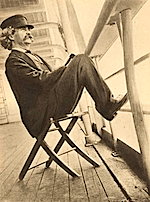
Twain, shipboard (ca 1870).
By LAURA BARTON [Intelligent Life] – It is evening, midweek and out of season, and the streets of Hannibal are quiet except for the workmen restoring Becky Thatcher’s house and the chirping of crickets. A handful of teenagers cluster near the Twain Museum, where a sign advises: “America’s Official Tom Sawyer and Becky Thatcher appear here every Friday and Saturday at 11:30am, Sunday 1pm.” The air is still warm, but the light casts cool, sharp shadows on the path down to the riverbank and splays itself in great burnished ripples across the river.
Here, 700 miles from the headwaters, the Mississippi stretches three-fifths of a mile wide, far across to the dark, wooded banks of Illinois. It runs north into Iowa and south to Kentucky, but right on this particular curve the river lies deep and silty, its banks rich with black walnut, maple and hickory trees, and the water itself, dappling blue and gold and olive-green. Standing here, I agree with Twain, who called this view “one of the most beautiful on the Mississippi.”
Continue reading “Noted: A Twain-like view of the river.” »
By MATT RICHTEL [New York Times] – This is your brain on computers.
Scientists say juggling e-mail, phone calls and other incoming information can change how people think and behave. They say our ability to focus is being undermined by bursts of information.
These play to a primitive impulse to respond to immediate opportunities and threats. The stimulation provokes excitement — a dopamine squirt — that researchers say can be addictive. In its absence, people feel bored.
Continue reading “Noted: Click here for a dopamine squirt.” »
By CLAY SHIRKY {Wall Street Journal] – Digital media have made creating and disseminating text, sound, and images cheap, easy and global. The bulk of publicly available media is now created by people who understand little of the professional standards and practices for media.
Instead, these amateurs produce endless streams of mediocrity, eroding cultural norms about quality and acceptability, and leading to increasingly alarmed predictions of incipient chaos and intellectual collapse.
Continue reading “Noted: Log on for enlightenment.” »
By DENIS BOYLES [Claremont Review of Books] – American exceptionalism, invented or real, has an exceptional usefulness for those tilters in need of a windmill. For a century or so, French, German, Italian, British, and Spanish politicians have all exploited anti-Americanism as a way of distracting voters from failed economic policies and doomed social experiments, just as European philosophers and writers have built careers pointing out American shortcomings from a European point of view, often in personal terms: Americans are fat, racist, uncaring, unfair, violent planetary polluters—all the myths Baldwin seeks to destroy. When Americans have written critically of Europe (and I’m one who has), it has been to point out the consequences of bad policies, especially foreign ones, and rampant hypocrisy. It will be forever before a person of African descent is elected to govern a European democracy, but to Europeans of a certain class and persuasion, American moral inferiority is simply assumed—something everybody just knows. “Today the U.S. is the most unequal of all the world’s developed nations in terms of income and wealth distribution,” a British professor of American Studies wrote, reviewing Hodgson’s book in the Times Literary Supplement. He was apparently citing himself, but may have used Gini coefficients from a 1999-2004 Luxembourg Income Study cited by Baldwin. According to that study, the U.K. is only the smallest fraction off the U.S. numbers for wealth distribution. But if the data from these studies are averaged over the decades 1970-1990, the U.S. actually lags behind countries such as France and Ireland, and the data show that income equality in the U.K. has risen rapidly recently, while the U.S figures are relatively static.
Continue reading “Noted: American exceptionalism?” »
By PHYLLIS BENNIS [Huffington Post] – Israeli commandoes murdered nine humanitarian aid workers in international waters. Nine were Turkish citizens; one a U.S. citizen. They wounded scores more. They imprisoned hundreds, and impounded the ships they hijacked on the high seas. Someone asked me the question: will they get away with it? So far, I answered, they HAVE gotten away with it. And if history repeats itself, if nothing changes, they will continue to get away with it.
Our job is to change history.
Continue reading “Noted: After the massacre.” »
 By THE STAFF OF THE JERUSALEM POST [An online petition] – Israel’s actions are deserving of reasoned, fact-based representation and criticism. This, it seems to us, is a reasonable expectation that is no longer being universally met.
By THE STAFF OF THE JERUSALEM POST [An online petition] – Israel’s actions are deserving of reasoned, fact-based representation and criticism. This, it seems to us, is a reasonable expectation that is no longer being universally met.
In too many parts of the world at present, criticism of Israel has strayed wildly beyond the parameters of elementary fairness and reason. Specific aspects of last week’s interception [of a convoy headed toward Gaza] have been maliciously misrepresented. Dishonest accounts of what occurred have been widely circulated and afforded credible platforms.
Opinion-shapers long hostile to the very fact of Israel’s existence have exploited the incident to incite against Israel’s right to defend itself from those who would destroy it. And, most worryingly, some leaders and nations who have hitherto shown the capacity to distinguish between legitimate criticism of Israel and malevolent discrimination against Israel have abandoned such reason.
Continue reading “Noted: A call for reason.” »
By SHLOMO BEN-AMI [as reported by Akiva Eldar in Haaretz] – In recent years, with the rise of the right in Western Europe, there has been an improvement in the attitude of important leaders there, like German Chancellor Angela Merkel and Italian Prime Minister Silvio Berlusconi.
Key governments in Europe contributed to the United Nations Security Council condemnation not mentioning Israel explicitly. Israel’s main problems in Europe are public opinion, the media and non-governmental organizations. This stems not only from Israel’s behavior but also from the political culture in Europe. Since the fall of Berlin, public opinion in Europe has not taken kindly, to put it mildly, to a state whose answers go through the use of force. Europe is not yet free of guilty feelings for the Holocaust and colonialism. This is part of the explanation for the frivolous ease with which images of the Holocaust are applied in Europe to Palestinians. For generations we have branded this mark of Cain on Europe’s forehead and today there is a process there of catharsis for Israel’s sins. Stupid moves of ours like the siege of Gaza and the settlements are adding fuel to the fire.
Continue reading “Noted: How to cure a leper state.” »
By JOHN HORGAN [Scientific American] – Craig Venter is the Lady Gaga of science. Like her, he is a drama queen, an over-the-top performance artist with a genius for self-promotion. Hype is what Craig Venter does, and he does it extremely well, whether touting the decoding of his own genome several years ago or his construction of a hybrid bacterium this year. In a typical Venter touch sections of the bacterium’s DNA translate into portentous quotes, such as this one from James Joyce: “To live, to err, to fall, to triumph, and to re-create life out of life.”
Continue reading “Noted: The Lady Gaga of science.” »
By JAMES MULHOLLAND [The Chronicle of Higher Education] – I agree that the humanities are in hard times. However, I propose that we stop talking about the “crisis,” even stop using the word. I suggest that we change our vocabulary and attitude, and begin to offer a cogent reassessment of what the humanities do and why they deserve to be maintained and expanded within the university. I want to link how we talk about the crisis with how we respond to it.
Continue reading “Noted elsewhere: It's time to stop mourning the humanities.” »

RIP?
By JOHN PALATTELLA [The Nation] – I’d like to talk about a meltdown, one that’s occurring not on Wall Street but Grub Street, that storied realm of writers, booksellers, bohemians and hacks. Though the problems on Grub Street are slight compared with the hardships that have befallen millions of people thanks mostly to Wall Street, they are matters of cultural importance. On Grub Street, for nearly a decade, and especially during the past four years, people have been wailing, rending their garments and otherwise voicing their displeasure over the deterioration of books coverage in the United States. (The meltdown on Grub Street coincided with the release of the Kindle in 2007, but the gales of anxiety and gusts of delirium stirred up in book publishing by digital readers are a different story.) The laments have focused mostly on newspaper books coverage because, rightfully or not, it has long been regarded as an accurate barometer of the delicate climate of literary life. Who hasn’t heard someone in a bookstore or a friend ask, “Have you read that novel the Times Book Review raved about”?
Continue reading “Noted elsewhere: The death and life of the book review.” »
By DAN SPEAK [The Prosblogion] – I am tempted by the claim that open theism is in a better position to respond to the problem of evil than is Molinism. Consider some particular evil e1 that has occurred at a particular time t2. A group of innocent German Jews is gunned down before a mass grave they have been forced to dig themselves, let’s say. On the open view, God knew at some time before t2 that e1 would occur. But God did not know that e1 would occur from time immemorial. It won’t be as if God has built e1 into the basic structure of the world, as it appears God does on Molinism. Intuitively, it seems to be easier to defend God’s failure to prevent e1 given that God becomes aware of its forthcoming occurrence at t1 rather than prior to the creation of the world. That, at least, is how it has seemed to me.
Continue reading “Noted elsewhere: An advantage of open theism?” »
By CHRISTOPHER CLA– USEN – [The Wilson Quarterly] – As the Civil War Sesquicentennial gets under way, the country still seems to be divided over what the war was about and, of more immediate importance, how Americans today should feel about it.
Moralists such as Thomas Friedman of The New York Times have no doubt that it was a war of good against evil. “We had a civil war in America in the mid-19th century because we had a lot of people who believed bad things—namely that you could enslave people because of the color of their skin,” he wrote recently, and many historians today would endorse both the substance and the harsh tone of his assertion. On the opposite side are the people McDonnell was appealing to—Southern patriots and battlefield re-enactors who in many cases are, like Friedman, in effect re-fighting the war, as well as ordinary Virginians whose great-grandfathers fought for the South without any sense that they were risking their lives to preserve slavery.
Continue reading “Noted elsewhere: History is not a mirror.” »
By Stephen Dodson
 FORTY YEARS AGO, WHEN I was a newly minted Russian major at Occidental College (having transferred from the math department because I discovered I liked language more than calculus), I was checking the shelves of the campus bookstore when my eye was caught by a blue paperback called Antiworlds. I picked it up and saw that it was a bilingual edition of Russian poetry, and leafing through it I learned that the author had given up architecture for poetry and that he wrote about things like parabolas, airports, and New York City. I read a short poem called “Goya” whose punchy rhythms, bravura off-rhymes, and fiery antiwar message took my breath away. I bought the book and read it obsessively. When I visited London on my way to the U.S.S.R. I stopped off at Foyles—sacred ground for a lover of bookstores—and bought a slim black Soviet hardcover of Voznesensky’s Akhillesovo serdtse (Achilles’ heart); I carried it with me everywhere, inspiring envy and some anger on the part of Russians my age, equally enamored of the young poet but unable to get hold of his books, which sold out the moment they were published.
FORTY YEARS AGO, WHEN I was a newly minted Russian major at Occidental College (having transferred from the math department because I discovered I liked language more than calculus), I was checking the shelves of the campus bookstore when my eye was caught by a blue paperback called Antiworlds. I picked it up and saw that it was a bilingual edition of Russian poetry, and leafing through it I learned that the author had given up architecture for poetry and that he wrote about things like parabolas, airports, and New York City. I read a short poem called “Goya” whose punchy rhythms, bravura off-rhymes, and fiery antiwar message took my breath away. I bought the book and read it obsessively. When I visited London on my way to the U.S.S.R. I stopped off at Foyles—sacred ground for a lover of bookstores—and bought a slim black Soviet hardcover of Voznesensky’s Akhillesovo serdtse (Achilles’ heart); I carried it with me everywhere, inspiring envy and some anger on the part of Russians my age, equally enamored of the young poet but unable to get hold of his books, which sold out the moment they were published.
Continue reading “Andrei Voznesensky, 1933-2010.” »
By JONARDON GANERI and CLARE CARLISLE [From the introduction to Philosophy as Therapeia] –
‘Empty are the words of that philosopher who offers therapy for no human suffering. For just as there is no use in medical expertise if it does not give therapy for bodily diseases, so too there is no use in philosophy if it does not expel the suffering of the soul.’
The philosopher Epicurus (341-271 BCE) gave famous voice to a conception of philosophy as a cure or remedy for the maladies of the human soul, and this recurring theme in Hellenistic thought has been the subject of two important recent studies.

Clare Carlisle.
What has not until now received a comparable degree of attention is just how prominent an idea it has been across a whole spectrum of philosophical tradition. Scholars of Buddhism have known for some time that a medical analogy features strongly in Buddhist conceptions of philosophical practice, but this fact has rarely been the object of explicit discussion. The idea that philosophy should be therapeutic, indeed that this is philosophy’s first function, was indeed widely spread in India, and the analogy between philosophy and medicine was put to important use in several other, non-Buddhist, Indian schools. In the West, too, this conception of philosophy has displayed a great resilience, persisting long past the Hellenistic age. It can and will be argued that medieval scholasticism, a mode of philosophizing now so often and often so naively criticised, should be understood as therapeutic in intent. If that is right it is important, because it allows us to see continuities between ancient, medieval and early modern thought where too often discontinuities alone are emphasised. For Spinoza too thought of philosophy as therapeutic, and after him Nietzsche and Wittgenstein. So the conception of philosophy as therapeia allows for, and even necessitates, a new reading of the history of philosophy, one in which deep continuities come into vision which have been obscured, a reading which also contradicts those who have wanted to maintain that philosophy is a peculiarly European cultural product, and instead affirms its identity as a global intellectual practice.
Continue reading “Excerpt: Philosophy as therapeia.” »
By VACLAV KLAUS [The Wall Street Journal] – As a long-standing critic of the idea of a European single currency, I have not rejoiced at the current problems in the euro zone because their consequences could be serious for all of us in Europe—for members and non-members of the euro zone, for its supporters and opponents. Even the enthusiastic propagandists of the euro suddenly speak about the potential collapse of the whole project now, and it is us critics who say we have to look at it in a more structured way.
Continue reading “Noted elsewhere: 'The euro zone has failed.'” »

























